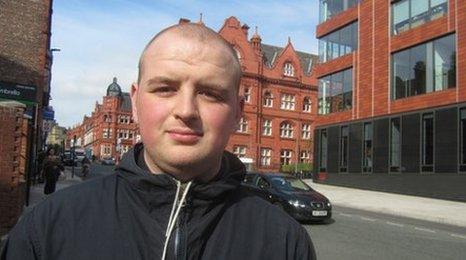Number of part-time young workers on the rise in the UK
- Published
Dot Smith has three part-time jobs
The number of UK part-time workers under the age of 30 has increased by 11% in the last five years.
Newsbeat's been given exclusive figures from the Office for National Statistics.
In 2007 there were just over 1.89 million part-time workers under 30. Towards the end of 2012, that figure had gone up to more than 2.1. million.
Ministers insist part-time jobs provide valuable experience and can be a stepping stone to increasing hours.
The figures reflect a rise in the number of young people who are unemployed.
Numbers rose by 11,000 in the last three months of 2012, the highest rise for a year.
Overall, the number of people with more than one job increased by 41,000 to 1.1 million.
However, the number of people of all ages claiming jobseeker's allowance has fallen to a near two-year low after a big increase in employment.
Three jobs
Dot Smith, 21, has three part-time jobs working as a lifeguard, waitress and charity spokesperson. She graduated with a 2:1 history degree in the summer of 2012.
"Since having a degree it hasn't really played to my advantage," she said. "Working part-time has been the only way to earn money.
"I can't turn down part-time work to focus on looking for full-time jobs because I can't afford to."
She's now living with her parents and can't afford to run a car. Dot's an example of someone who's underemployed, working part-time but not being given enough hours.
She added: "I didn't go to university to be a waitress for the rest of my life. It's better than being on benefits and I am lucky to have three jobs but I don't want to be in this situation."
'Suits lifestyle'
The government says eight out of 10 people are working part-time because it suits their lifestyle.
A spokesperson from the Department for Work and Pensions said: "There has actually been a greater increase in full-time working since the election (2010): full-time work is up by almost half a million since the last government."
The number of part-time workers has been broadly rising across all age groups (16+) since the mid-1980s.
Duncan Weldon is a senior economist for the UK's biggest trade union group, the TUC.
He said: "It means their income is lower than expected, they've possibly got gaps in their CV and it could damage long-term career prospects.
"It's actually bad for the wider economy. If people are earning less, they're spending less."
- Published31 January 2013

- Published25 January 2013

- Published2 January 2013

- Published17 October 2012
